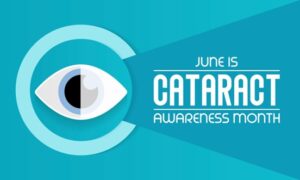Learn More About Cataracts this Cataract Awareness Month
June is Cataract Awareness Month, an important time to spread knowledge about cataracts, a leading cause of vision loss in the United States and globally. The ophthalmologists in New Jersey at The Medical Group of New Jersey are dedicated to educating the public about the risks, prevention, and treatment options for cataracts, emphasizing the importance of early detection and eye care management.
Understanding Cataracts
A cataract is a clouding of the eye’s natural lens, which lies behind the iris and the pupil. This condition develops slowly and can affect one or both eyes. While cataracts are commonly linked to aging, they can also result from other risk factors such as diabetes, smoking, prolonged exposure to ultraviolet sunlight, and previous eye injuries.
Reducing the Risk of Cataracts
While aging is a major factor in cataract development, there are several ways you can reduce your risk or delay their onset:
- Protect your eyes from UV light: Wearing sunglasses that block 100% of UV rays and a hat with a brim to shield your eyes can significantly reduce your exposure to harmful UV rays.
- Manage health problems: Keep diabetes and other health conditions well-managed by following your doctor’s advice closely. Diseases like diabetes can increase your risk of cataracts if not properly managed.
- Quit smoking: Smoking significantly increases the risk of cataracts and can accelerate their development. Quitting smoking can help mitigate this risk.
- Eat a healthy diet: Diets rich in vitamins C and E may help to prevent cataracts. Eating a lot of fruits and vegetables containing antioxidants can be beneficial.
- Reduce alcohol use: Excessive consumption of alcohol can increase the risk of cataract formation.
Recognizing the Signs of Cataracts
Recognizing the early signs of cataracts can lead to timely treatment, which can significantly improve treatment outcomes. Here are common symptoms to watch for:
- Blurred vision: Cloudiness over the eye’s lens can lead to blurred vision, which is often described as looking through a foggy window.
- Difficulty with vision at night: Individuals with cataracts often report difficulties driving or seeing in low light conditions.
- Sensitivity to light and glare: Headlights, lamps, or sunlight may appear too bright. Halos may also appear around lights.
- Fading or yellowing of colors: Colors may not appear as bright as they once did.
- Double vision in one eye: This is specifically noted in the eye affected by the cataract.
Importance of Regular Eye Examinations
Regular eye exams become increasingly important as you age, especially if you are at risk for cataracts. During Cataract Awareness Month, we encourage everyone, particularly those over the age of 60, to schedule an eye examination. Early detection of cataracts not only helps in managing the condition effectively but also evaluates if and when you might need surgery.
The treatment for cataracts has advanced significantly, with surgery being a common and safe option. Cataract surgery involves removing the cloudy lens and replacing it with an artificial lens. It is one of the most successful procedures performed in medicine today.
As your committed ophthalmologists in New Jersey, The Medical Group of New Jersey is here to help you maintain your vision health. This June, let’s shed light on cataracts and take proactive steps towards a clearer future. Whether you need an eye exam or have questions about cataracts, our team is ready to assist you.